All set for vote counting in Jharkhand tomorrow; NDA, JMM-led alliances confident of winning
BJP leader and former Jharkhand Chief Minister Babulal Marandi said NDA will win more than 51 seats.
Hochul spearheads plan to pay NYers to switch to green appliances amid state money woes

New York is rolling out a new incentive for residents who switch to green alternatives for their household appliances. In an announcement Thursday, Gov. Kathy Hochul revealed that her state will be the first to offer a rebate under a new Appliance Upgrade Program. The rebate, funded by the Inflation Reduction Act (IRA), offers low-and moderate-income households up to $840 if they switch out their fossil fuel-powered clothes dryers with heat pump-powered alternatives. “New York is demonstrating its continued commitment to ensuring an equitable energy transition by leveraging all federal funds available to incentivize consumers to make energy-efficient appliance purchases a priority,” Hochul said in a statement. EXPERTS RIP ‘TRIPLE CROWN OF BAD REGS’ AS BIDEN ADMIN POSTS GAS STOVE RULE IT DENIED WAS A BAN “As a result of these new rebates, low- and moderate-income New Yorkers will save energy and money while doing their laundry with modern technology that will reduce emissions,” she added. 5 INSANE BIDEN-HARRIS APPLIANCE REGULATIONS HEADING YOUR WAY The New York State Energy Research and Development Authority (NYSERDA), also praised the new initiative. “NYSERDA is pleased to start distributing this IRA funding for home appliance rebates through a customer-centric approach that ensures low-and moderate-income New Yorkers can easily upgrade inefficient clothes drying equipment or purchase a dryer for the first time,” NYSERDA said. The handout comes as New York ranks as having the second-highest debt burden in the nation in 2021, according to the New York State Comptroller. The comptroller’s office released a report on the state’s financing plan, which projected New York would issue over 3.4 times more debt than it will retire over the next five years. New York has been pushing to phase out fossil fuels in the state but has been previously criticized for its initiatives. Officials announced in May 2023 that beginning in 2026, New York will prohibit gas stoves and heating systems for new construction of buildings seven stories or fewer, according to reports. “I think it’s ridiculous, and I think the danger is that it almost seems comedic and so people can take it, you know, maybe not as seriously as they should,” New York Senate Minority Leader Rob Ortt told Fox News Digital in an interview before the ban. “It is going to increase people’s utility rates in the state of New York, it is going to decrease energy reliability in the state of New York, and it will do nothing to fight climate change.”
New York judge grants Trump request to file motion to dismiss charges, cancels sentencing indefinitely
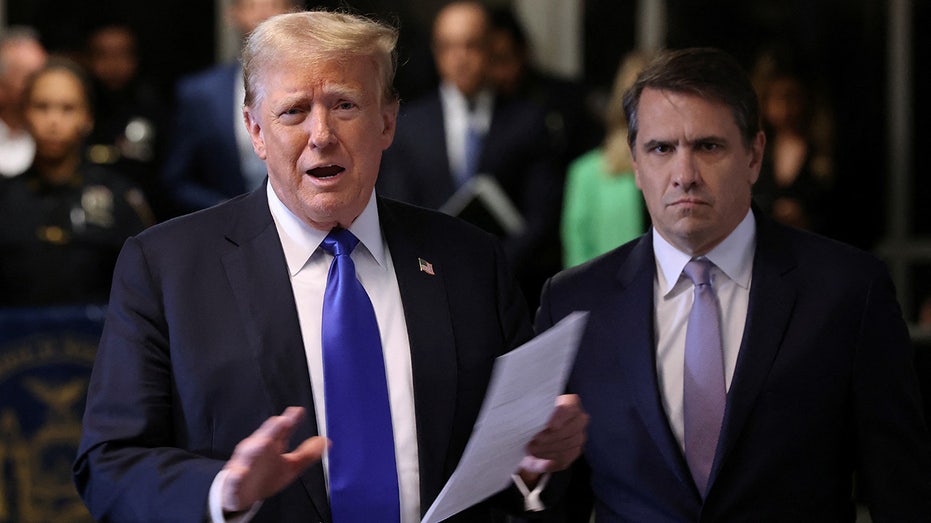
Judge Juan Merchan on Friday granted President-elect Donald Trump’s request to file a motion to dismiss the charges in New York v. Trump and removed the sentencing date for the president-elect from the schedule. Merchan said Trump attorneys have until Dec. 2 to file their motion for dismissal. Merchan said Bragg has until Dec. 9 to respond. Merchan also confirmed the stay in sentencing for Trump, which was requested by both Trump’s and Bragg’s attorneys. The sentencing was scheduled for Nov. 26, but on Friday, Merchan said that date “is adjourned.” Trump spokesman and incoming White House communications director Steven Cheung reacted to Merchan’s ruling Friday, telling Fox News Digital it is a “decisive win” for the president. “In a decisive win for President Trump, the hoax Manhattan Case is now fully stayed and sentencing is adjourned,” Cheung told Fox News Digital. “President Trump won a landslide victory as the American People have issued a mandate to return him to office and dispose of all remnants of the Witch Hunt cases.” Cheung added, “All of the sham lawfare attacks against President Trump are now destroyed and we are focused on Making America Great Again.” In a letter to Merchan on Wednesday, Trump defense attorney and now-nominee for Deputy Attorney General Todd Blanche demanded the case against Trump be tossed. “On November 5, 2024, the Nation’s People issued a mandate that supersedes the political motivations of DANY’s ‘People,’” Blanche wrote. “This case must be immediately dismissed.” Blanche said that “immediate dismissal of this case is mandated by the federal Constitution, the Presidential Transition Act of 1963, and the interests of justice, in order to facilitate the orderly transition of Executive power following President Trump’s overwhelming victory in the 2024 Presidential Election.” BRAGG CASE ‘EFFECTIVELY OVER’ IN ‘MAJOR VICTORY,’ TRUMP OFFICIALS SAY Blanche’s pre-motion letter on Wednesday was sent in order to request permission to file a motion to dismiss by Dec. 20 and to request a stay on all deadlines, which Bragg and New York prosecutors had agreed to. The letter came after Bragg sent a letter to Merchan on Tuesday requesting a stay on the case until 2029. Bragg said he would oppose Trump’s motion to dismiss but said he would be open to receiving the defense argument. Blanche argued that Bragg “appears to not yet be ready to dismiss this politically-motivated and fatally flawed case, which is what is mandated by the law and will happen as justice takes its course.” Blanche pointed to Bragg’s own election campaign for another term as Manhattan district attorney. Blanche argued that “continuing with this case would be ‘uniquely destabilizing’ and threatens to ‘hamstring the operation of the whole governmental apparatus, both in foreign and domestic affairs.’” “The Court must address these new issues and dismiss the case, prior to issuing a decision on the previously filed Presidential immunity motion,” Blanche explained. “Any other action would obviously violate the presidential immunity doctrine and the Supremacy Clause.” TRUMP LAWYERS DEMAND BRAGG CASE BE ‘IMMEDIATELY DISMISSED,’ SAY ELECTION ‘SUPERSEDES’ POLITICAL ‘MOTIVATIONS’ Blanche added that “even if the Court were to wrongly deny the new interests-of-justice motion, which it should not do, the appropriate forum for any additional proceedings must first be resolved in President Trump’s removal appeal.” Blanche said that if the court denies any aspect of relief, including by moving forward with any proceedings, Trump would request that the court stay the implementation of the ruling so that President-elect Trump has “adequate time to pursue appellate review.” Trump pleaded not guilty to 34 counts of falsifying business records in the first degree stemming from the yearslong investigation related to alleged hush money payments run by the Manhattan District Attorney’s Office. Former Manhattan District Attorney Cyrus Vance initiated the investigation, and Bragg prosecuted Trump. After an unprecedented six-week trial in New York City, a jury found the president guilty on all counts. PROSECUTORS REQUEST STAY IN TRUMP NY CASE UNTIL 2029 AS DEFENSE PLANS MOTION FOR DISMISSAL ‘ONCE AND FOR ALL’ Merchan last week granted a stay on all deadlines associated with conviction proceedings against Trump in the final weeks before he is sworn in as the 47th president of the United States — including the Nov. 26 sentencing date. Trump officials on Tuesday argued that Bragg’s request was a representation of “a total failure of the prosecution,” and interpreted the case as being “effectively over.” Meanwhile, Trump attorneys had requested that Merchan overturn the guilty verdict altogether, citing the U.S. Supreme Court’s decision that former presidents have substantial immunity from prosecution for official acts in office. The Supreme Court’s 6-3 decision on presidential immunity came from a question that stemmed from charges brought against Trump in a separate, federal case brought by special counsel Jack Smith related to the events on Jan. 6, 2021 and any alleged efforts to overturn the results of the 2020 election. Trump pleaded not guilty to all charges in that case.
‘Great meeting’: Tim Scott reveals Trump’s ‘all in’ to help GOP protect majority in 2026 midterms
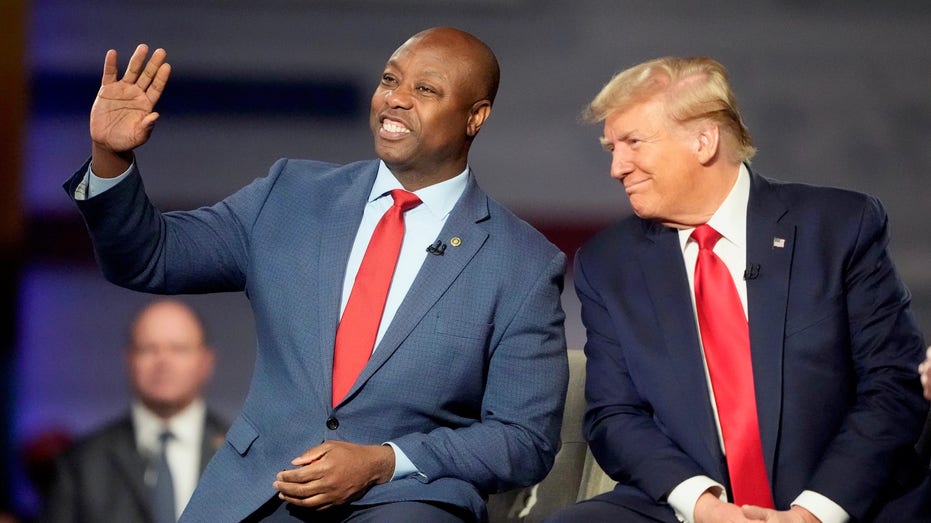
Sen. Tim Scott of South Carolina, the new chair of the National Republican Senatorial Committee, says President-elect Trump is on-board to help the senator in his mission to protect and expand the newly won GOP majority in the Senate. Scott, who last week was elected by his Republican colleagues as chair of the Senate GOP campaign committee, met with the former and future president at Trump’s Mar-a-Lago resort in Palm Beach, Florida. “Just had a great meeting with President @realDonaldTrump! He’s all in to help the @NRSC keep a Republican majority for his entire four years AND create a generation of opportunity!” Scott wrote in a social media post on Thursday night. TRUMP ALLY TIM SCOTT’S NEW MISSION TO TO HELP THE INCOMING PRESIDENT After losing the Senate majority in the 2020 elections, the GOP flipped four Democrat-held seats earlier this month, and will control the chamber 53-47 when the next Congress convenes at the beginning of the new year. In his first interview following his election as NRSC chair, Scott told Fox News Digital last week that “what we’re going to do is defend the seats that we have and expand the map so that we can increase the majority brought to us by the Trump victory.” In this month’s elections, unlike in 2016 and 2020, Trump outperformed many of the GOP’s Senate candidates. JD VANCE IS THE HEIR APPARENT TO TRUMP, BUT HERE ARE SOME OTHER REPUBLICANS WHO MAY RUN FOR PRESIDENT IN 2028 Scott told Fox News Digital that he wants Trump to participate as much as he can in the 2026 Senate contests. “Every day and every way, President Trump, I know you have a full-time job. I’m going to ask you to have two full-time jobs. Let’s expand this map,” Scott emphasized. He said “that means that every single day we need President Trump on the campaign trail, doing fundraisers, talking to folks, because this is President Donald J. Trump’s party, and we need to make sure we expand it, from the man to the movement. We need him to do it.” Scott last year unsuccessfully ran for the 2024 Republican presidential nomination, before ending his bid and endorsing Trump. The senator was a high-profile surrogate for Trump on the campaign trail this year. While not as favorable as the 2024 Senate map, the 2026 electoral landscape does give the Republicans some opportunities to flip seats. Democratic Sens. Jon Ossoff of Georgia and Gary Peters of Michigan are up for re-election in two years in key battleground states Trump flipped last week. And Sen. Jeanne Shaheen of New Hampshire will be up for re-election in a perennial swing state that Trump lost but over-performed from his 2020 showing. In Virginia, where Trump lost by just five points last week, Democratic Sen. Mark Warner will be up for re-election. HERE ARE THE DEMOCRATS WHO MAY EVENTUALLY RUN FOR THE WHITE HOUSE IN 2028 “How do you expand the map?” Scott asked. “You look at Georgia and Michigan and New Hampshire and Virginia. And if you’re stretching – take a look at New Mexico and Minnesota. President Trump was very competitive in those states.” But Republicans will also have to play defense. GOP Sen. Susan Collins of Maine is up for re-election in a reliably blue state. And Sen. Thom Tills of North Carolina is also up in 2026, in a battleground state that Trump narrowly won. Scott emphasized that “the good news is as long as Susan Collins is running, I think we have a shot to win. Last time, she won by several points. This time, she’ll win by several points. Thom Tillis staying in North Carolina is good for our party.” THIS DEMOCRATIC SENATOR MAY BE TAKING OVER THE PARTY’S SENATE CAMPAIGN COMMITTEE In the 2022 election cycle, when the Republicans blew a chance to win back the majority, NRSC chair Sen. Rick Scott of Florida was criticized for a hands-off approach in the GOP Senate primaries. This past cycle, now-former NRSC chair Sen. Steve Daines of Montana got involved in Senate Republican nomination battles. Asked whether the NRSC will take sides in competitive Republican Senate primaries during his tenure the next two years, Scott told Fox News, “I think the best thing for us to do is have a family conversation next year about what we’re looking at. How we’re going to defend that map and then make the best decisions we can as it relates to making sure that we end up with more seats than we currently have.” “Thank God we’re at 53. I’d like to see 55,” Scott added. Asked whether holding 55 seats was his goal, Scott joked, “if it were up to me, we’d have 100 seats.” Sen. Kirsten Gillibrand, who easily won re-election earlier this month in blue-state New York, is expected to take over as chair of the rival Democratic Senatorial Campaign Committee. Senate Democrats will hold their leadership elections later this year. David Bergstein, the DSCC communications director for the past couple of election cycles, told Fox News that “in a challenging political environment, Democrats made history. We won multiple races in states won by Trump. We dramatically over-performed the presidential results. And for the first time in over a decade, Senate Democrats have won multiple races in states won by the opposite party’s presidential nominee.” “The outcome of this cycle puts Senate Democrats in the strongest possible position to reclaim the majority in 2026,” Bergstein touted.
A strong treaty can end plastic pollution and save lives
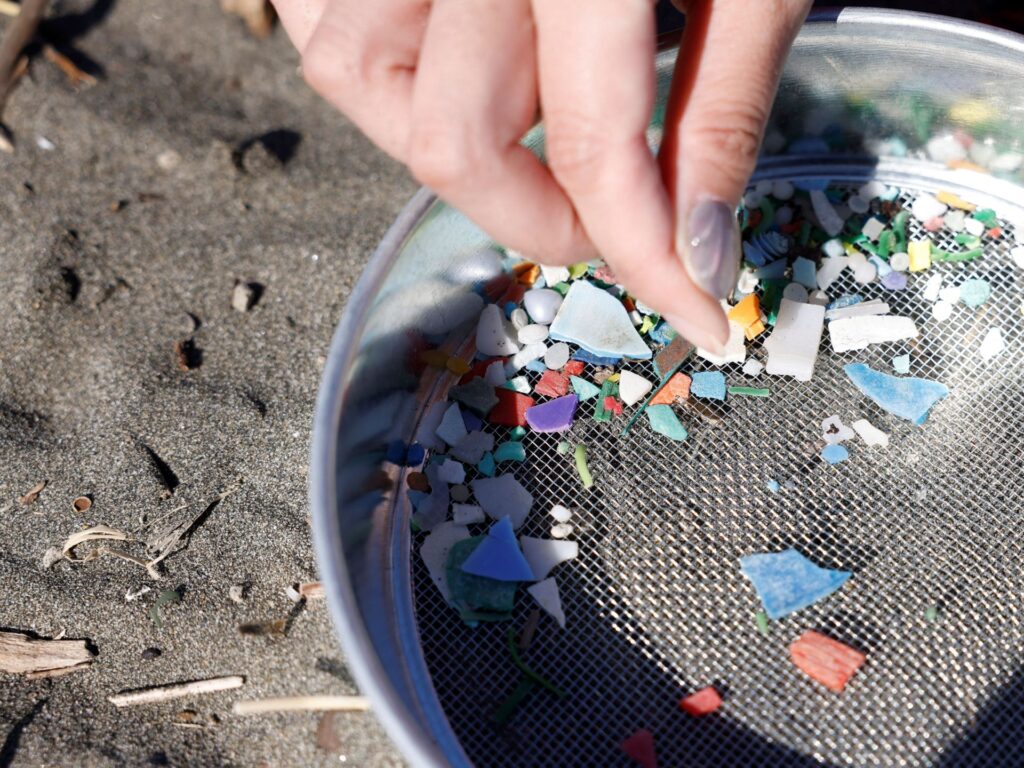
Two years ago, global leaders promised to establish a treaty by the end of 2024 that would lay the groundwork to end plastic pollution. The words used then to describe the treaty, such as “international”, “legally binding” and “addresses the full plastics lifecycle”, suggested a strong global treaty with teeth, one that evoked hope that countries were ready and united to do the utmost. Since then, and after four divisive rounds of negotiations due to consistent opposition from a small minority of oil-producing countries, language governing the scope and mandate of this treaty has been pared down, with strong measures at risk of being replaced with weak alternatives such as “nationally-determined”, “voluntary”, and “waste management” (rather than the full plastics lifecycle). This week, as we head into the fifth and final round of negotiations, scepticism about whether negotiators will reach a strong global treaty is understandable. However, we must not give in to those who seek to continue with business as usual. Governments must stand strong and unite to prevent irreversible loss for all, knowing that they have the support of the rest of the world. We have done this before – the Montreal Protocol on ozone-depleting substances provides us with a shining example of how countries can come together to agree on common global rules that have brought us back from the brink. We must do this again and we must do it now as plastic pollution is rapidly escalating the threats to both nature and humanity. Failure is not an option when there’s ample proof of plastics’ pervasive danger. Two years ago, just after the world agreed to create the treaty, researchers detected, for the first time, microplastics in human breast milk, potentially poisoning our children. The more vulnerable among us need our support – not because they cannot help themselves, but because individual actions are insufficient to tackle the issue without the systemic changes needed to end plastic pollution. This is where our leaders need to step up and put in place a strong global treaty that the world not only wants but urgently needs. The reasons we must take action now are clear, and so are the solutions that an effective treaty must entail. One, a strong treaty will save lives. Research indicates that the current volume of plastic pollution is projected to increase exponentially, and it is already destroying ecosystems and wildlife populations, prompting climate change and infiltrating our bodies through the air we breathe and the food and water we consume. To protect human lives and nature from the worst effects of plastic pollution, we need a strong treaty that bans the most harmful plastic products and chemicals. Additionally, a strong treaty is one that establishes global product design requirements so we can ensure the plastics we use are safe and can be effectively recycled. Two, a strong treaty will help us address some of the current inequalities created and exacerbated by plastic pollution. The world is inundated with plastic pollution, yet its effects are not felt equally. In low-income countries, the lifetime cost of plastic is 10 times higher than in wealthier nations. Even in affluent countries, the plastic pollution toll can be severe and even deadly for some, as seen in Cancer Alley in the United States, an economically distressed area that accounts for a quarter of the country’s petrochemical production. Decades of plastic, petrochemical, and industrial pollution have led to this region having the highest cancer rate in the US. To counter the crippling inequities in the plastics value chain, a strong treaty must contain robust financial mechanisms to support a just transition, especially in the Global South. This means aligning both private and public financial flows with the treaty’s obligations, while also mobilizing and distributing additional financial resources – especially for implementation in developing countries – to reduce plastic pollution. Furthermore, a treaty like this, through the mechanisms we just discussed, will be capable of halting harmful financial flows that contribute to the crisis. Lastly, a strong treaty is the only approach that has the potential to deliver on the goal of ending plastic pollution. From scientists and governments to citizens and businesses, there is widespread agreement that the world urgently needs a treaty with global binding obligations. This type of treaty will raise the bar, create a level playing field for all, and mandate a shift away from destructive business-as-usual models towards meaningful systems change. Securing enduring and impactful global action requires courage and leadership in carving a path that breaks free from harmful and deeply ingrained practices. Our leaders must take responsibility and be accountable for the promise they made two years ago to deliver a strong treaty, one that we need to put our planet on a path to recovery. The views expressed in this article are the author’s own and do not necessarily reflect Al Jazeera’s editorial stance. Adblock test (Why?)
Will Israel’s Netanyahu and Gallant ever be arrested?
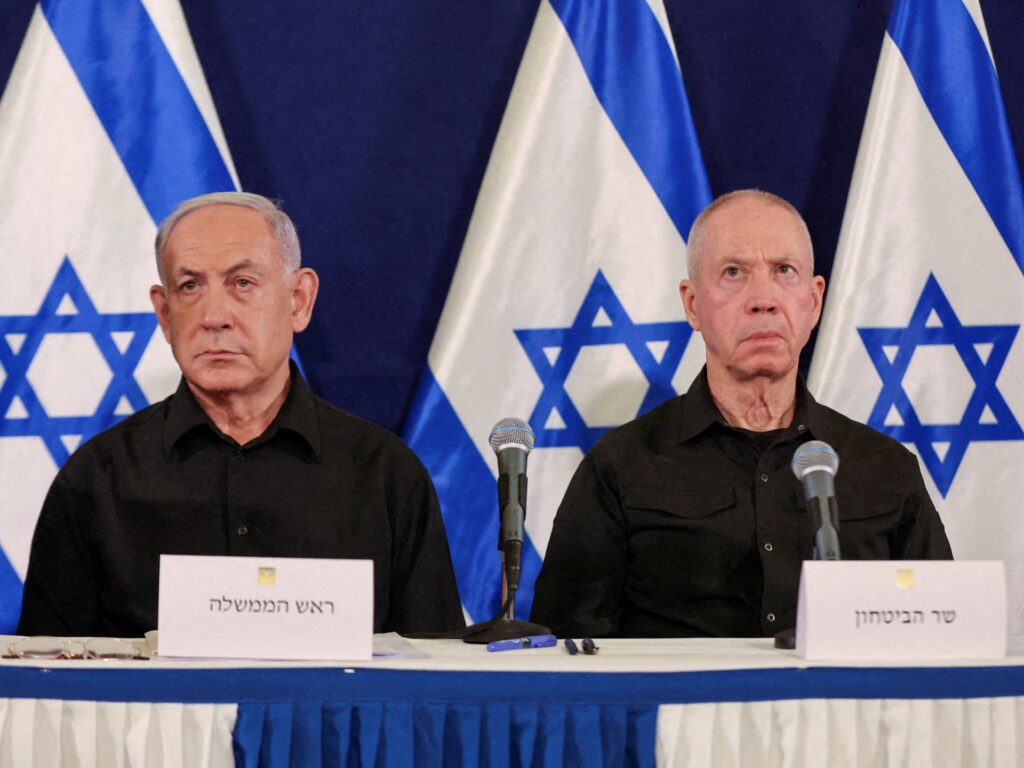
NewsFeed The International Criminal Court issued arrest warrants for Israel’s Prime Minister Benjamin Netanyahu, former Israeli Defence Minister Yoav Gallant and Hamas commander Mohammed Deif. More than 120 countries that are part of the ICC are obliged to enforce the arrest warrants, but are they prepared to act? Al Jazeera’s Virginia Pietromachi explains. Published On 22 Nov 202422 Nov 2024 Adblock test (Why?)
What do we know about Russia’s new ballistic missile, Oreshnik?
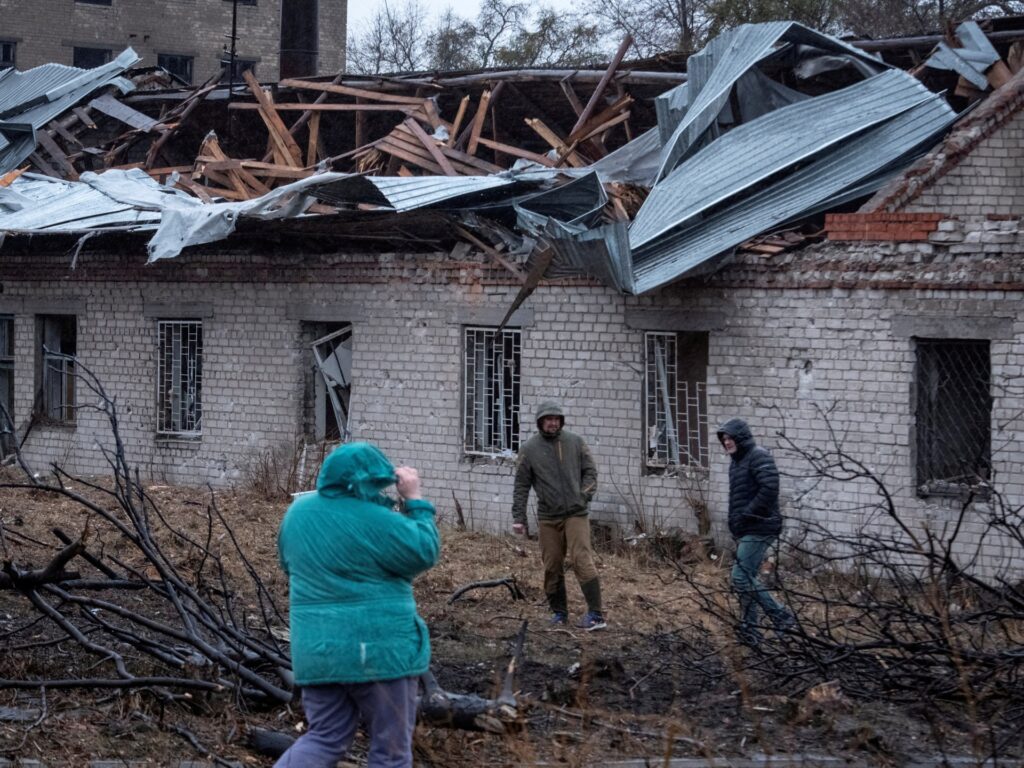
President Vladimir Putin has confirmed that Russia tested a hypersonic intermediate-range missile in an assault on the Ukrainian city of Dnipro, Ukraine. The Kremlin said the attack was in response to Ukraine’s recent use of US- and UK-supplied missiles to target Russian territory. Joe Biden, the outgoing US president, and his administration only recently gave the green light for Ukraine to launch long-range strikes into Russia, a move which has escalated tensions. The Pentagon said the US had been notified of the launch through nuclear risk reduction channels. Here is what you need to know: What is the Oreshnik, Russia’s new ballistic missile? The new intermediate-range ballistic missile, Oreshnik, which means hazel tree in Russian, is a nuclear-capable weapon that has not been previously mentioned publicly. The Pentagon said it is based on the “RS-26 Rubezh” intercontinental ballistic missile (ICBM). Hypersonic missiles travel at speeds of at least Mach 5 – five times the speed of sound – and can manoeuvre mid-flight, making them harder to track and intercept. The missile can have three to six warheads, military expert Viktor Baranets wrote in the Komsomolskaya Pravda tabloid. Igor Korotchenko, editor of the Moscow-based National Defence journal, told the TASS state news agency that based on video footage of the strike, Oreshnik has multiple independently guided warheads. Why has Russia used this missile now? Russia is in retaliation mode. The launch came after Ukraine fired US- and UK-supplied missiles on Russian territory for the first time, escalating tensions in the nearly three-year-long conflict. This followed the reversal of a ban on Kyiv, which had been placed by Washington, on using high-precision Army Tactical Missile Systems (ATACMS) to strike targets in Russia. Moscow says six US-made ATACMS missiles were launched at Russia on Tuesday, while British Storm Shadow cruise missiles and US-made HIMARS were fired at the country on Thursday. Moscow says this makes Western countries that authorise Ukraine to use their missiles to hit Russia direct participants in the conflict. Kremlin spokesman Dmitry Peskov said on Friday that Moscow was in “no doubt” that Washington had understood that the strike on Dnipro was a warning. “The main message is that the reckless decisions and actions of Western countries, which produce missiles, supply them to Ukraine, and subsequently take part in carrying out strikes on Russian territory, cannot remain without a reaction from the Russian side,” Peskov said. What has Putin said about the attacks? In an unscheduled television appearance on Thursday, Putin said the strike on the city of Dnipro had tested in combat conditions “one of the newest Russian mid-range missile systems”. Putin said it had been deployed “in a non-nuclear hypersonic configuration” and said the “test” had been successful and had hit its target. Putin said air defences cannot intercept the Oreshnik. “Modern air defence systems… cannot intercept such missiles. That’s impossible,” Putin said. “As of today, there are no means of counteracting such a weapon,” the president boasted. Putin also stated that Russia will “address the question of further deployment of intermediate and shorter-range missiles based on the actions of the United States and its satellites”. What has Ukraine said about the strike? Kyiv claimed that Russia had used an intercontinental ballistic missile (ICBM) along with a barrage of other missiles at Dnipro. Local authorities said the attack hit an infrastructure facility and injured two civilians. President Volodymyr Zelenskyy warned of a “clear escalation”. An intercontinental ballistic missile (ICBM) has a range of 1,000-5,500km (621 to 3,418 miles), a level below that of an intermediate-range ballistic missile. Ukraine’s Main Intelligence Directorate said it was fired from the 4th Missile Test Range, Kapustin Yar, in Russia’s Astrakhan region and flew 15 minutes before striking Dnipro. The missile had six warheads, each carrying six submunitions. The peak speed the missile reached was 11 Mach. What happens next? NATO will hold an emergency meeting with Ukraine at the alliance headquarters in Brussels on Tuesday to discuss Moscow’s use of the missile, a NATO source said on Friday. The Western military alliance confirmed that the NATO Ukraine Council, grouping allies’ NATO ambassadors and their Ukrainian counterparts, will convene at Kyiv’s request, but did not give any detail on the topic of discussions. Adblock test (Why?)
Cash-for-votes row: BJP leader Vinod Tawde issues defamation notice against Mallikarjun Kharge, Rahul Gandhi
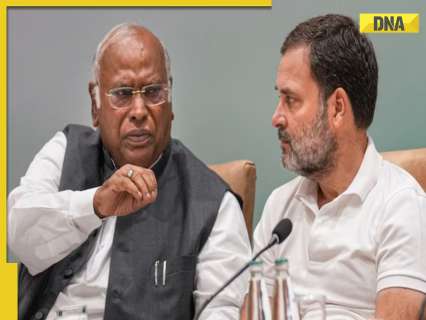
Bharatiya Janata Party (BJP) national general secretary Vinod Tawde has issued a defamation notice against Congress president Mallikarjun Kharge, Leader of Opposition (LoP) in Lok Sabha Rahul Gandhi and party’s spokesperson Supriya Shrinate.
The World’s First Innovative Iron Supplement to Combat Iron Deficiency and Anaemia

Iron deficiency is one of the most neglected yet preventable nutritional deficiencies worldwide, affecting over 1.6 billion people. This deficiency often leads to iron deficiency anaemia, which disproportionately impacts women.
FeFCon 2024 to be Held in Bangalore: A Premier Event on Fever Management

Bangalore, India (22 November) – The seventh edition of FeFCon (Fever Foundation Annual National Conference) is set to take place on November 23 and 24, 2024, in Bangalore.

